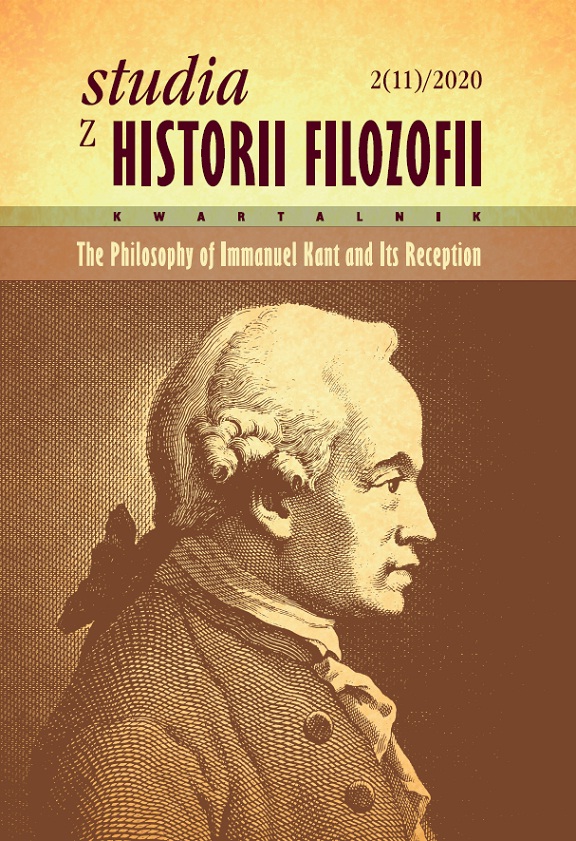Kants kognitive Konstruktivität in der Erkenntnis und als Grenze des Rechts
DOI:
https://doi.org/10.12775/szhf.2020.013Słowa kluczowe
Transzendental, knowlege as making, schematism, right of revolutionAbstrakt
Kant used Copernicus’ upheaval in thinking on astronomy to illustrate the profoundness of his critique of traditional metaphysics as ‘system of pure reason’. The consequence for philosophy is the following: the perspective of an eternally valid pure reason as a means of gaining knowledge of the world is abandoned – because this approach results not in knowledge, but only in dogmas. Instead, we engage with Kant in a change of perspective. It is grasped how the operative subject manages perception in a changing, agitated world. Instead of understanding perception merely as a mirroring, mimetic achievement, Kant moves to understanding perception as poiesis, as construction, as experimental philosophy. That means: to qualify as perception, something has to be shown to be contrivable, to be construable. This constructiveness of the active subject does not only shape processes of knowledge and perception, but also changes our environment through revolutionary processes in politics and society. Reason in revolutions becomes evident in constituting the legal practice of civil and human rights (Bill of Rights und Code civil).
Bibliografia
Annalen der brittischen Geschichte. 1791. Bd. 5.
Benjamin Walter. 1979. Deutsche Menschen. Leipzig/Weimar: Kiepenheuer.
Briefwechsel Aron Gurwitsch/Alfred Schütz. 1985. München: Springer.
Chamisso Adalbert v. 1842. Werke. Leipzig: Weidmannsche Buchhandlung, Der europäische Aufseher. 1805.
Gregorovius. 2017. Europa und die Revolution. Leitartikel 1848–1850. München: Beck.
Hebbel Friedrich. 1905. Tagebücher. Historisch-kritische Ausgabe. Berlin: B. Behr’s.
Kant Immanuel. 1781 [A] und 1787 [B]. Kritik der reinen Vernunft. Riga: Hartknoch.
Kant Immanuel. 1931. Gesammelte Schriften. Berlin: De Gruyter.
Kant Immanuel. 1988. Rechtslehre. Berlin: Akademie.
Kant Immanuel. 1992. Streit der Fakultäten. Leipzig: Reclam.
Lenk Hans. 1995. Schemaspiele. Frankfurt/M.: Suhrkamp.
Lessing Gotthold Ephraim. 1897. Sämtliche Schriften. Leipzig: Göschen.
Marx Karl. 1975. MEGA. Berlin: Dietz.
Novalis. 1965. Schriften. Stuttgart: Kohlhammer.
Ortega y Gasset José. 1978. Gesammelte Werke. Stuttgart: dtv.
Plessner Hellmuth. 1970. Philosophische Anthropologie. Frankfurt/M.: Suhrkamp.
Schelling Friedrich Wilhelm Joseph. 1860. Sämmtliche Werke. Stuttgart: Cotta.
Schlegel Friedrich. 1963. Kritische-Friedrich-Schlegel-Ausgabe. Paderborn: Schöningh.
Zeitschrift f. Philosophie u. philosophische Kritik. 1913.
Zeitung für die elegante Welt. 1807.
Pobrania
Opublikowane
Jak cytować
Numer
Dział
Statystyki
Liczba wyświetleń i pobrań: 635
Liczba cytowań: 0



